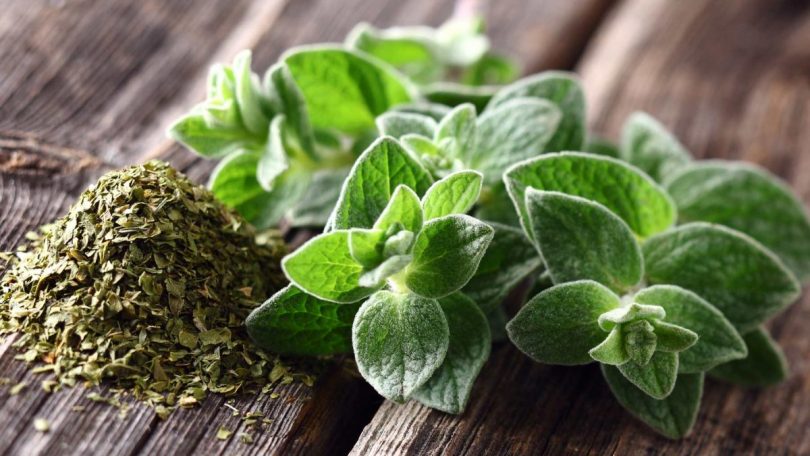Here are the most common health benefits of oregano.
It might be interesting for people to know that oregano is one of the culinary herbs we can use in the kitchen and most culinary herbs have a wide range of use as they are also used in the home pharmacy.
If you love making pesto for your family for whatever specific purposes (stuff chicken breast, veggie dip, toss with pasta, etc.), know that oregano is one of the ingredients you can use to make this sauce.
Dried oregano has similar benefits, so if you want to enjoy the benefits, but don’t have the possibility to harvest or buy fresh oregano … here is how to dry oregano at home.
Oregano Health Benefits
Historically, we don’t know whether people first used oregano in cooking or it was used first for its medicinal potencies. It’s hard to tell the facts for most herbs, but with oregano, we now know that it is both used in the kitchen and in the home pharmacy.
Benefit #1: Oregano is diaphoretic
Being diaphoretic, oregano can induce perspiration, bringing about a host of benefits to the body including:
- Increased blood circulation through the organs, muscles, and tissues
- Release of alcohol and waste products through the skin (natural body detox)
- Elimination of salts from the body (prevent kidney stones from forming)
Oregano being a diaphoretic technically means that it causes heat to move from the core of the body out to the peripherals and also causes the blood vessels to dilate making things nutrients to be distributed faster.
Because it can move moisture and heat out of the body, oregano is used to reduce fever and make the body feel cooler.
Benefit #2: Bronchial dilator
Oregano can relax bronchial muscles, which results in the expansion of the bronchial air passages in the lungs. As a bronchodilator, you can use the herb if it happens that anybody in your family suffers from asthma.
Also, if you have lung congestion or mucus, or you frequently have bouts with flu and cold, you can use this herb. Drink a cup of oregano tea or honey infused with oregano extract.
Benefit #3: Improvement of digestive health
One of the reasons that culinary herbs are used in cooking is because they support digestive health quite effectively, and practically, all culinary herbs have this particular health benefit. So, if we are talking of 25 or 40 herbs, all of those can help with the health of the digestive system.
In particular, oregano’s benefit to digestive health is related to the antimicrobial properties that enable it to help maintain bacterial balance in the gut and also in speeding up digestion of oils and fats in the gut.
What the herb does is stimulate circulation in the GI tract, which results in the fast breakdown of nutrients. Oregano also relaxes the gastrointestinal muscles, which helps with gas expulsion.
So, using oregano for digestive health targets two areas – reducing symptoms associated with digestive issues, and promoting fast absorption of nutrients.
Benefit #4: Inflammation
Oregano has the effect of blocking substances that cause inflammation, and this can readily be tested if you experience headaches. Take a leaf. Chew it or grind it and then put it on your forehead.
Additionally, you do the same thing if you have tension headaches. Smell the ground leaf and it will improve mental clarity and help open the nasal passages for restful breathing.
This will also clear your mind and help with cerebral circulation, which is very helpful as it will increase oxygen and nutrient supply which your brain needs for it to function properly.
There are a number of other herbs used for pain relief. As alternatives, you can use eucalyptus, cloves, capsaicin, peppermint, and lavender.
Benefit #5: Nutritive value
Oregano contains a handful of important nutrients including folate, magnesium, vitamin A and potassium, and other nutrients that facilitate several biological processes.
Folate is important because it supports fetal development. It also lowers the risk of neural birth defects.
Vitamin A, on the other hand, is essential for maintaining skin and eye health.
Magnesium is also a crucial component of people’s diet because it plays a role in neuromuscular transmission and muscle contraction. If you experience muscle cramps, it can be a sign that your body is deficient with this mineral.
Magnesium supplements are also recommended for people with blood pressure issues.
Muscle cramps are also symptoms found in people with potassium deficiency, along with weakness, fatigue, and constipation. Potassium also supports healthy cardiac function.
We can’t cover them all in this post, but here is a full list of nutrients that oregano contains (apart from those already mentioned):
- Vitamins C, E, and K
- Calcium
- Iron
- Fiber
- Vitamin B6
Benefit #6: Anti-oxidative activity
Oregano can inhibit oxidation, which is a chemical reaction that can produce free radicals in the cells of an organism. Thus, the herb offers protection at the cellular level preventing the development of cancer. Ascorbic acid or vitamin C has this same effect on the body.
Oregano is listed with an Oxygen Radical Absorbance Capacity (ORAC) value of 175,925, which means it has a very high antioxidant activity, and when compared to apples, the fruit registers only one-fifth of oregano’s ORAC.
Antioxidants that oregano contains include apigenin, luteolin, salvagenin, cirsimaritin and apigenin.
Benefit #7: Antimicrobial activity
Research has shown that oregano also possesses antimicrobial properties, which means it can kill harmful microorganisms, such as staph, Pseudomonas aeruginosa, and Acinetobacter baumannii. These are microbes that can cause diseases in humans and animals and even plants.
READ ALSO: How to Harvest Oregano





